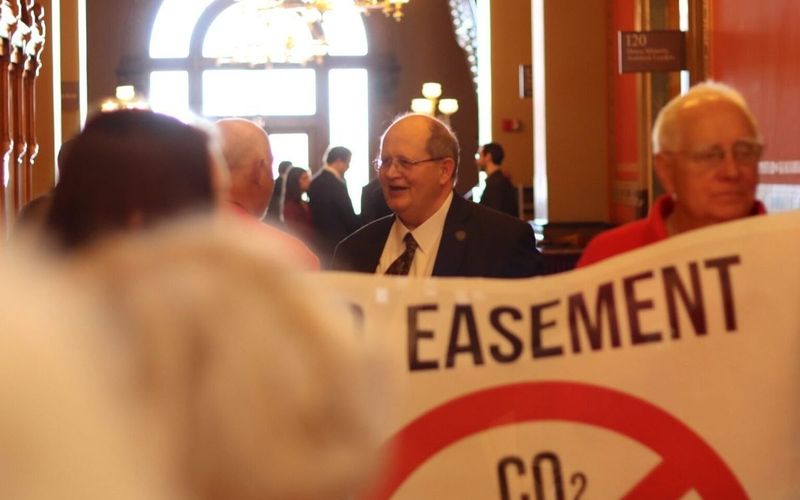The issue of eminent domain as it pertains to a carbon sequestration pipeline project in Iowa has put Republicans at odds with one another, but Gov. Kim Reynolds’ Wednesday decision to veto a bill on the issue has amplified the tensions.
On a call with landowners opposed to the pipeline project and upset by the veto, Rep. Steven Holt, a Republican from Denison and one of the lawmakers leading eminent domain and pipeline-related legislation, said there will be “consequences for the governor’s agenda” moving forward.
“The governor’s lack of leadership is why we are where we are today, and it will affect her agenda going forward until the end of her term,” Holt said.
Landowners on the call were similarly upset by Reynolds’ decision, following years of silence on the issue. Peg Rasmussen, who owns land in Montgomery County, said “a true leader steps in when a problem arises” but “Reynolds did nothing.”
“The legacy you leave behind is one of bowing down to big business at the expense of Iowans,” Rasmussen said.
Tensions around eminent domain and carbon sequestration pipelines have risen in response to proposed projects in Iowa.
Three projects, Navigator CO2, Wolf Carbon Solutions and Summit Carbon Solutions have sought to build carbon sequestration pipelines through Iowa.
The first two projects were withdrawn, but the Summit project received a permit from the Iowa Utilities Commission in June 2024 and has more than 1,300 voluntary easements signed for the project.
Landowners opposed to the pipelines have lobbied for four years against the projects, and in particular their ability to use eminent domain. This year lawmakers narrowly passed House File 639 to change the definition of a common carrier for hazardous liquid pipelines, increase insurance requirements, set permit limits and add requirements to the IUC.
Opponents of the bill said it changed the rules in the middle of the game, had unintended consequences to critical energy infrastructure and would stop Iowa from leading the nation in biofuels production.
Landowners also directed their animosity toward Republican lawmakers who opposed the bill, namely at senators who failed to take up the issue for four years, then argued House File 639 was a bad bill.
“The fight for private property rights will continue,” Rasmussen, who was part of a group of landowners regularly lobbying at the State Capitol, said. “Iowa legislators and Gov. Reynolds, we’ll see you at the Capitol in 2026, and we can’t wait to tell our legislators how we feel about their votes in the 2026 election.”
Holt said the “leadership void” from the governor and “civil war” among Senate Republicans has exposed the difference between “country club Republicans” and “grassroots Republicans.”
Rep. Charley Thomson, a Republican from Charles City who wrote the now-vetoed HF 639, and who, with Holt, has led much of the legislation on the issue, said the opposing Republicans are part of the “anything-for-a-buck ‘wing’ of the party” and don’t represent the “vast majority” of Iowa Republicans.
“In the governor’s view, constitutional rights, such as eminent domain protections, should not be allowed to interfere with schemes to make money, especially if those schemes are being promoted by her friends, supporters, and contributors,” Thomson wrote in a statement.
Bruce Rastetter, founder of Summit Agricultural Group, which started Summit Carbon Solutions, has been a top campaign contributor to Reynolds’ campaigns, sparking some of the criticism leveled at the governor.
In her explanation of the veto decision, Reynolds wrote the bill had “vague legal standards” and would impact projects beyond just the use of eminent domain. Reynolds cited the permit limits clause in the bill and increased requirements for insurance as setting a precedent that “threatens” the state’s business reputation.
Senate President Amy Sinclair expressed the same beliefs on the bill. In a recent appearance on Iowa Press, Sinclair said HF 639 “was not a property owners rights bill” but rather a bill “that’s just going to facilitate activists.”
“To say I was a person who opposed property rights, that’s 100% false,” Sinclair said on the show.
Sinclair and other Republicans who were opposed to HF 639 voted for a re-write amendment to the bill, sponsored by Sen. Mike Bousselot, R-Ankeny, that would have allowed companies to avoid eminent domain and instead pursue voluntary easements outside of the project corridor. It also would have held operators responsible for damage to the land for the project’s lifetime.
Thomson said Reynolds’ stated concerns were a “polite window-dressing” for the governor’s “real message” that she will “veto any bill that Summit Carbon Solutions dislikes.”
In reaction to the veto, Rep. Bobby Kaufmann, R-Wilton, vowed during a Radio Iowa interview to “work to kill every single piece of legislation that has (Reynolds’) name on it.”
The governor’s office did not respond to a request for comment on the attacks from lawmakers.
Summit Carbon Solutions, in a statement following the veto, said it looks forward to “continued discussions with state leaders” as the project advances.
Thomson and Holt said they are supportive of House Speaker Pat Grassley’s call to petition for a special session in order to override the veto of the bill.
The motion for a special session, and to override the veto, would require support from both chambers, which Senate majority leadership indicated Wednesday would be unlikely.
Corey Cerwinske, a Bremer County supervisor attending the virtual press conference, said lawmakers should introduce articles of impeachment on the governor for her “malfeasance.”
Holt said while the veto “may violate” the constitutional rights of Iowans, the governor’s action “probably doesn’t rise to the level of impeachment.”
In her veto explanation, Reynolds asked the Iowa Utilities Commission to implement a section of the bill that required attendance at informational meetings and during live testimony.
This was a problem brought up by landowners and lawmakers during the proceedings for the Summit Carbon Solutions permit. They alleged IUC would send representatives to meetings rather than commissioners, and that all three commissioners were not present during live testimony.
The IUC in a Thursday press release said it “fully supports” the “transparency goals” the governor requested and “will begin implementing” the practices. The release said the commission will also reinstate its public, monthly commission meetings beginning in August.
“The IUC remains dedicated to fair, transparent, and accountable governance of Iowa’s energy and utility infrastructure,” the statement read.













